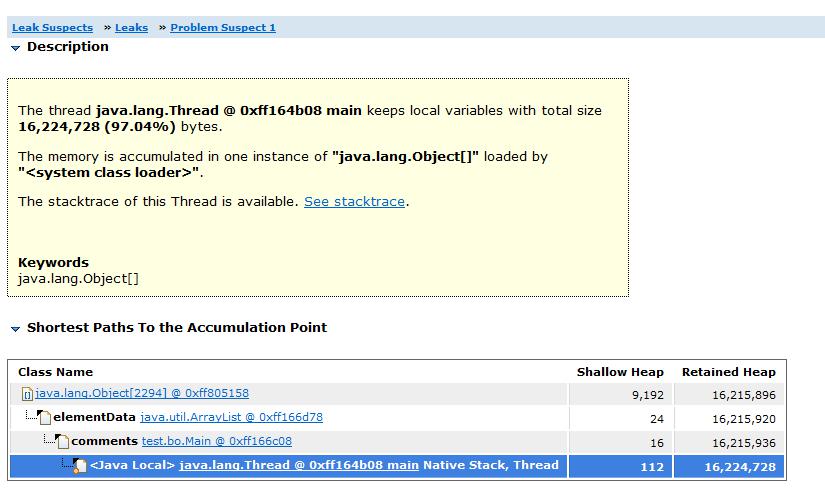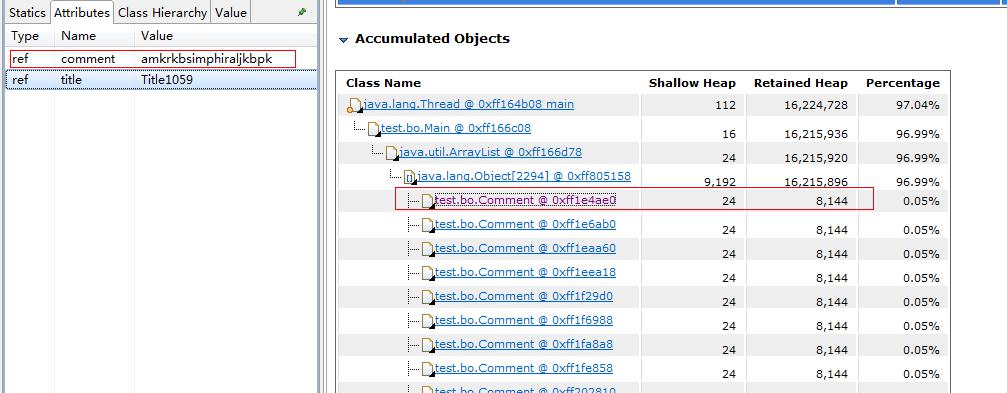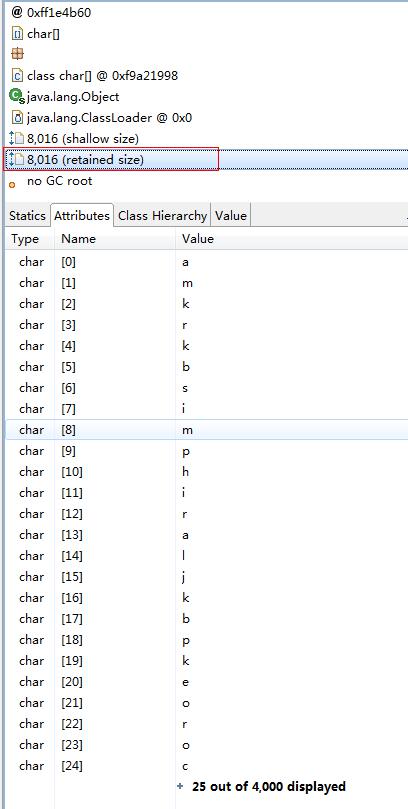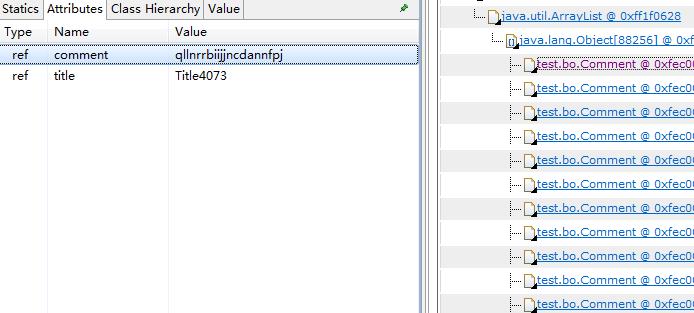谁喂饱了你的内存
?最近同事在做大数据量操作的时候,在一个明显不应该出现内存溢出的地方,报出了OutOfMemoryError?,经过分析终于找到了原因。本文中,将模拟当时的情景,重现并分析出这个问题。
先看实例代码,2个类:
package?test.bo;
?
public?class?Comment?{
private?String?title;
private?String?comment;
?
public?String?getTitle()?{
return?title;
}
?
public?void?setTitle(String?title)?{
this.title?=?title;
}
?
public?String?getComment()?{
return?comment;
}
?
public?void?setComment(String?comment)?{
this.comment?=?comment;
}
}
Comment,一个简单的PO,有两个字符串的属性。
?
?
package?test.bo;
?
import?java.util.ArrayList;
import?java.util.List;
import?java.util.Random;
?
public?class?Main?{
List<Comment>?comments?=?new?ArrayList<Comment>();
?
public?static?void?main(String[]?args)?{
Main?mainClass?=?new?Main();
for?(int?i?=?0;?;?i++)?{
Comment?comment?=?new?Comment();
comment.setTitle("Title"+i);
comment.setComment(generateComment(4000).substring(0,?20));
mainClass.addComment(comment);
}
?
}
?
private?void?addComment(Comment?comment){
this.comments.add(comment);
}
?
private?static?String?generateComment(int?length){
Random?randGen?=?new?Random();??
char[]?numbersAndLetters??=?("abcdefghijklmnopqrstuvwxyz0123456789ABCDEFGHIJKLMNOPQRSTUVWXYZ").toCharArray();?
?char?[]?randBuffer?=?new?char[length];
?for?(int?i=0;?i<randBuffer.length;?i++)?{??
?randBuffer[i]?=?numbersAndLetters[randGen.nextInt(20)];
?}
?return?new?String(randBuffer);
}
}
?
Main类中,去做了一件事:往实例变量comments中不断地插入数据,直到程序内存溢出,至于generateComment方法,只是为了每次构造的comment字符串是不同的。
?
在运行程序之前,先给虚拟机设置两个限制参数,并且在内存溢出的时候,生成内存快照:
-XX:+HeapDumpOn
-Xms20m
-Xmx20m
?
运行程序,接着就会出现OutOfMemoryError。
?
用Eclipse?Memory?Analyzer打开内存快照,如图:

?
对象comments,占用了大部分的内存,这是列表里面的Comment对象占用了内存,
随便点开一个查看其内容,如下图:

?
其中,每一个Comment对象占用的内存大小都是一样的,8144,对象中只有两个字符串,一个是comment,一个是title,总共一起三十个字符左右,怎么会占用这么大的内存?
?
?
?
看看comment里面是什么值:

?
继续看里面的值:

?
这个,不就是我们当时创建的随机字符串么?
?
为什么会出现这样的情况?
?
?
按照上面的分析,应该是value这个属性引用了那个长度为4000的字符串。
看String的substring方法的实现:
?public?String?substring(int?beginIndex,?int?endIndex)?{
if?(beginIndex?<?0)?{
????throw?new?StringIndexOutOfBoundsException(beginIndex);
}
if?(endIndex?>?count)?{
????throw?new?StringIndexOutOfBoundsException(endIndex);
}
if?(beginIndex?>?endIndex)?{
????throw?new?StringIndexOutOfBoundsException(endIndex?-?beginIndex);
}
return?((beginIndex?==?0)?&&?(endIndex?==?count))???this?:
????new?String(offset?+?beginIndex,?endIndex?-?beginIndex,?value);
????}
?
最后,调用了这一句:
new?String(offset?+?beginIndex,?endIndex?-?beginIndex,?value);
?
这是一个什么构造方法?
看看它的实现:
????String(int?offset,?int?count,?char?value[])?{
this.value?=?value;
this.offset?=?offset;
this.count?=?count;
????}
?
我们的随机字符串是通过如下的构造方法来的:
public?String(char?value[])?{
this.offset?=?0;
this.count?=?value.length;
this.value?=?StringValue.from(value);
????}
?
也就是说,在构造这个随机字符串的时候,就把这个4000长度的char数组赋值给随机字符串的value属性了。
而在我们substring的时候,又顺便将value赋值给了新生成的String的value属性,也就是说:
substring方法过后,新生成的字符串,保留了对原来字符串的一个备份。
这样一来,内存中存在了很多不需要的字符串不能被GC掉,
是这些喂饱了你的内存。
?
?
果真是这样的吗?
如果是这样,我们在最开始的时候,就只传入20个长度的字符串,就应该不会有8144长度的字符串,修改一下代码:
......
public?static?void?main(String[]?args)?{
Main?mainClass?=?new?Main();
for?(int?i?=?0;?i?<?1000000;?i++)?{
Comment?comment?=?new?Comment();
comment.setTitle("Title"+i);
comment.setComment(generateComment(20));
mainClass.addComment(comment);
}
}
......
?
这样产生溢出之后,再来分析它的内存快照:

?
只有184了,明显小了,查看每个Comment对象的comment属性,也正常了,如图:

?
?
看来,还真的是substring这个方法的问题,这种情况该如何规避呢?
修改代码:
?
......
public?static?void?main(String[]?args)?{
Main?mainClass?=?new?Main();
for?(int?i?=?0;?i?<?1000000;?i++)?{
Comment?comment?=?new?Comment();
comment.setTitle("Title"+i);
comment.setComment(
new?String(generateComment(4000).substring(0,?20)));
mainClass.addComment(comment);
}
}
......
?
再看溢出快照:
 ?
?
?
已经和没有substring的情况一样了。
<!--EndFragment-->